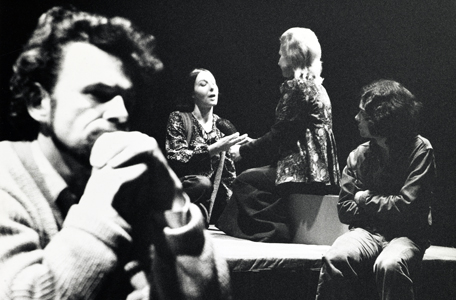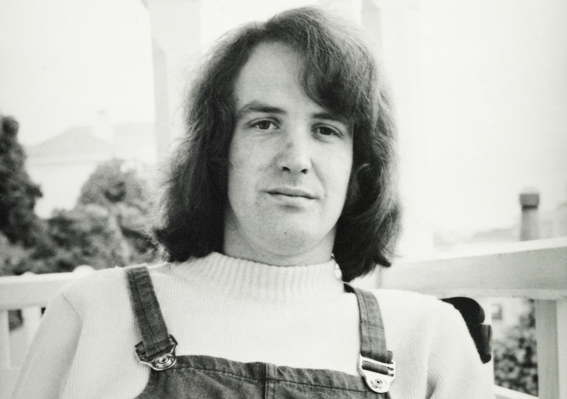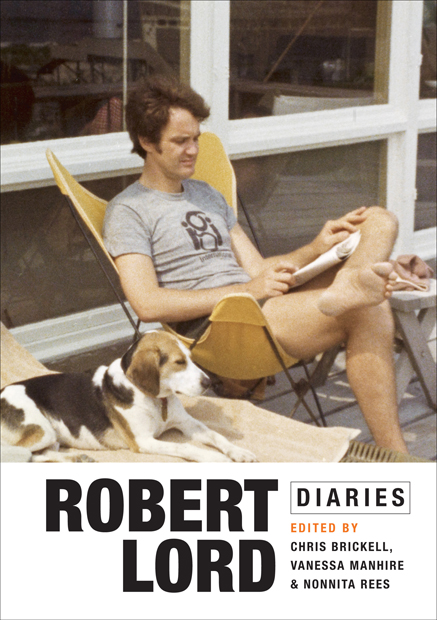New Zealand's Gayest Playwright?
‘Of course, being gay & effeminate in a country which above all prizes rude masculinity doesn’t make life simple’, playwright Robert Lord wrote in his diary in 1981. Lord, who wrote over 20 plays for stage and radio, was born in Rotorua in 1945 and moved wherever his banker father was posted. Eight diaries chronicle his adult life and work in the ‘small, contained culture’ of New Zealand society, as he put it, and also in frenetic, cosmopolitan New York. There he took a small apartment, scraped together a living by writing, typesetting and selling real estate, and partied with his friends on Fire Island.

Robert and his beagle, Becky, in Central Park.
Joyful and Triumphant, Robert Lord’s best-known play, was first performed in 1992 after his death from an AIDS-related illness on 7 January that year. Joyful and Triumphant follows several generations of a small-town New Zealand family over eight Christmas Days between 1949 and 1989. Bert and Maisy, another drawing-room drama from 1983 that deals with small-town life, outsiders, and the limits of respectability, was made into a television series.
But Robert’s earlier plays are the most off-beat. The middle-aged parents in Balance of Payments, from 1972, live off the earnings of their well-endowed rent-boy son who picks up men at swimming pools and in saunas. His mother knits underwear for him to pose in, and his father demands to know the finer details of his craft. Both insist he maximises his income: ‘You’ve got an investment which you have to capitalise on. You’ve got definite commitments which mean you’re obliged to show returns.’ One day, when he brings home only eight dollars, his furious mother stabs and kills him with a knitting needle. Her need to devise a cover story for police – and a newfound lust for blood – lead her to shoot two subsequent visitors to the house: the vicar who pops in for a chat, and a client of her son who turns up for a pre-arranged assignation. Three bodies lie stacked on top of one another in the living room by the time the play comes to an end.
Ostensibly about heterosexual relationships, the enigmatic Meeting Place, also from 1972, is even more grim. There are ongoing homoerotic tensions between its two female and two male characters, none of whom is honest about who they really are. Self-deceptions are embellished as people interact with those around them, and this theme lies at the heart of many Robert Lord scripts. Meeting Place includes a considerable amount of same-sex touching and a vivid description of a casual pickup that turns into a gay bashing. The same-sex pairings have a real intensity in this complex and multi-layered play.

Meeting Place, Downstage Theatre, 1972.
Overture, a four-page script, is a small gem hidden away in the stacks of the Dunedin’s Hocken Library. It dates from the mid-to-late-1970s. Set in New York’s Central Park, Overture tells the story of two unnamed men, one of whom is cruising for sex while the other denies he went into the park for the same purpose. The first man asks: ‘I couldn’t help but noticing you were looking in my direction. Do you find me sexually attractive? I had the feeling you were undressing me with your eyes’. He speaks of his own sexual experience with evident exaggeration: ‘I had a lover, Julio. I swear one look from Julio could bring me to the point of ejaculation.’ The second character says he has travelled from Queens to look at the oak trees in the park as inspiration for his painting. When the first man reveals the trees are in fact Dutch elms, not oaks, his new companion relents, declares ‘I’m ready now’, and returns to the first man’s apartment. On a Weekday in Summer is another play that never saw the light of day. This tells of a man who attempts to murder his wife so he can be with his male lover.
Glitter and Spit, a one-act play written in 1975 and first staged in the Otago town of Ranfurly in 1982, toys with conventions of sexuality and gender. Among the four characters, Daniel is a soldier who asserts his masculinity by strutting about in a military uniform. In one scene Daniel attacks Richard, the conductor of a small orchestra, for wearing a tutu. ‘You’re not a man. Fairy! Ponce! Pansy! Poofter!’ But the tables are turned when Daniel tries on the tutu himself. Louise, Daniel’s former girlfriend, is delighted: ‘I haven’t seen Daniel quite so spontaneous since he put up the venetians.’ Megan, Daniel’s new wife, reacts very differently. ‘I thought you were a man. A respected soldier too! I’ve never heard anything quite like it. Pervert!’ The characters in Glitter and Spit spend time standing in the shoes (and tutus) of others.

Robert in Wellington in 1972.
Robert Lord first took homoerotic themes onto the stage in 1972, just as Gay Liberation began to make its mark in New Zealand. His plays gesture towards the concepts of coming out and homophobia, popularised by lesbian and gay activists, but he also addressed the malleability of sexuality. Dead and Never Called Me Mother, for instance, is a 1975 story of a married woman who has an affair with a suave young man assumed by others to be 'queer' ('he goes to a gym', another character says in evidence). The final script is more restrained than Lord's original notes. These envisaged something more 'obscene and camp', with an openly gay Lothario, anal and oral sex, and strong Shakespearean overtones. Most of the characters in China Wars, a 1987 farce based on life in suburbia, Spode crockery, and human deceit, alternate their romantic attentions between men and women. In Joyful and Triumphant, Raewyn, who usually winds up in heterosexual relationships, lives for a while with Harley-riding Liz. There are intimations of bisexuality in Bert and Maisy too (this play was initially titled A Hint of Scandal).
Robert Lord is usually remembered for his family dramas, but the queer aspects of his playwriting have so far been paid little attention. His rich body of work is well worth revisiting.
Robert Lord Diaries, edited by Chris Brickell, Vanessa Manhire and Nonnita Rees, was published by Otago University Press in October 2023.

Sources:
Robert Lord's diaries are held in the Hocken Collections under an access embargo.
Brickell, C. 'The Rough and the Tumble: Queer Themes in Robert Lord's Plays', Australasian Drama Studies, 84 (April) 2024: 125-148.
Overture; Dead and Never Called Me Mother: unpublished scripts, Hocken Collections.
Balance of Payments; Meeting Place; Glitter and Spit: photocopied manuscripts, Otago University Library.
Lord, R., Bert and Maisy, Dunedin, 1988.
Lord, R. Joyful and Triumphant, Wellington, 1993.
Balance of Payments photographs courtesy of Bronwyn Wallace and Finn Boyle.